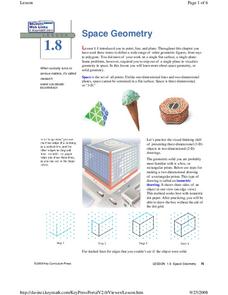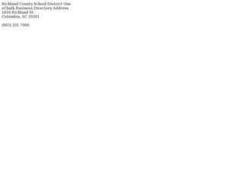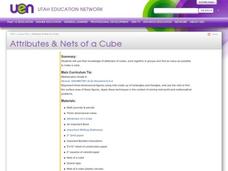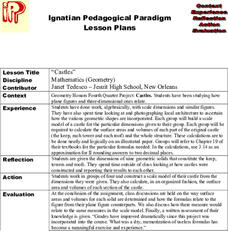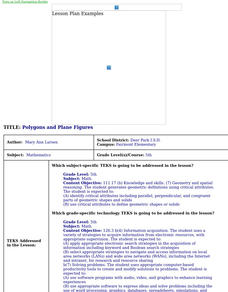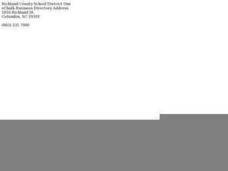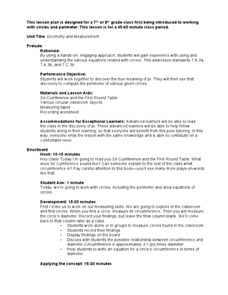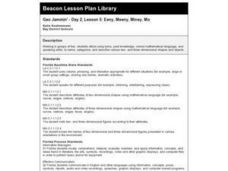Curated OER
Opening A Cube
Fifth graders investigate mathematical concepts related to the construction of a three dimensional cube. They construct the cube from two dimensional patterns and compute the surface area. Students also define the faces, edges, and...
Curated OER
Geometry: Plane Figures
In this plane figure worksheet, students complete 4 multiple choice questions, determining which solid figure can be traced to make a given plane figure. A reference web site is given for additional activities.
Curated OER
Color Me Square
Second graders identify and describe basic geometric solids. Working as a class, 2nd graders describe geometric solids using the proper vocabulary and counting faces, bases, corners, and edges. In pairs, students use a computer drawing...
Houghton Mifflin Harcourt
Unit 6 Math Vocabulary Cards (Grade 5)
Acute angles, nets, and vertices are only a few terms that a set of flash cards includes. Among the 108 cards, two types are available; word cards printed in bold-faced lettering, and corresponding definition cards equipped with an...
Curated OER
Space Geometry
Learners explore points, lines and planes as it relates to geometry. In this geometry activity, students analyze space and explain wy it is 3-D and not flat or 2-D. They solve problems involving volume and 3-D shapes.
Curated OER
A World of Symmetry
Students identify lines of symmetry. In this symmetry instructional activity, students create objects and identify their lines of symmetry. They answer questions about lines of symmetry. Students cut shapes out of cookie dough and...
Curated OER
Attributes & Nets of a Cube
Third graders engage in a lesson that focuses on the attributes and forming of a cube. They construct a cube using different combinations while comparing a square with only two-dimensions. Students fold paper while following the...
Curated OER
Castles
Students create a scale model to a castle using the dimensions they were given. They calculate the surface areas and volumes of each section of their castle.
Curated OER
Ruler and Compass Constructions
Fourth and fifth graders examine how to construct perpendicular lines and to bisect angles using rulers and compasses in this unit of lessons. They design a number of polygons using these methods.
Curated OER
Pyramids & Prisms: Guler's Formula
Sixth graders compare and contrast two-dimensional shapes to three-dimensional shapes. After watching a demonstration, they make their own shapes using nets printed on paper. To end the instructional activity, they use the shapes they...
Curated OER
Congruence with Robot Gobot
Students identify the properties of solids and polygons. For this geometry lesson, students identify the different measurements of a triangle. They use congruence parts and theorem to prove their answer.
Curated OER
Polygons and Plane Figures
Learners choose a polygon to define and describe, and use Power Point and the Internet to present their polygon.
Curated OER
Cubic Unit Models
Fourth graders find the volume of solids. In groups, 4th graders use spinners to determine the dimensions of solids. They construct the shapes, creating a model of the figure Students count the cubes in the model to determine the...
Curated OER
More Prisms/Nets
Students calculate the volume and surface are of three-dimensional shapes. In this geometry lesson plan, students use the nets to prove their calculations of shapes. They identify the different parts of a solid using the nets.
Curated OER
Surface Area of Rectagular Prisms
Sixth graders investigate the area of polygons. For this geometry lesson, 6th graders calculate area of prisms using geometric formulas. They work with prisms and other rectangular shapes.
Curated OER
Euler Characteristic
Students identify the different properties of Euler's Characteristics. In this geometry lesson, students identify the shape and surface a polygon. They relate the concept of Euler to solving real world problems.
Curated OER
Sketching Cylinders
Learners create nets of cylinders. In this geometry lesson, students calculate the surface area of cylinders and other solids. They show their understanding of three-dimensional shapes by solving problems.
Alabama Learning Exchange
Pennies, Pennies and More Pennies
Learners determine the number of pennies needed to fill a room. For this pennies lesson plan, students work in groups to determine the number of pennies needed to fill a room. They compute the probability of the head of a pin landing...
Curated OER
Geometry and Measurement
Learners view a right triangle displayed by the teacher. Students measure legs and the interior angles of the triangle. They look for a pattern or relationship between the legs and angles. Learners use pegboards and string to create more...
Curated OER
Classifying Polygons
Students study polygons. In this math lesson, students play a game in which they learn the classification system for polygons. Students identify the properties of quadrilaterals.
Curated OER
Classify Prisms
Students classify prisms according to their attributes. In this classifying prisms lesson, students explore different prisms. Students generate observations of the attributes and classify the prism correctly.
Curated OER
Sort It Out and Match It Up
Students identify objects that are the same shape and size. They compare and contrast attributes of two-and three-dimensional objects using appropriate vocabulary. Pupils justify an extension of a geometric pattern to explain what was...
Curated OER
Geo Jammin' - Day 2, Lesson 5: Eeny, Meeny, Miney, Mo
Students, in groups, use song lyrics and math to descrie two and three dimensional shapes.
Curated OER
Matter
Students complete a unit of activities to learn about states of matter and how to measure matter. In this matter activity, students complete 8 lessons to learn about matter, its states, and how to measure matter.






